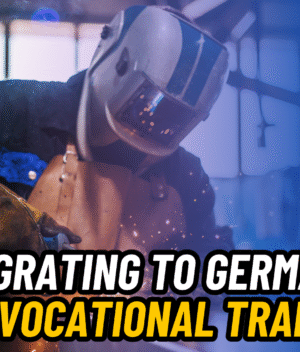Immigrating to Germany with vocational training

According to recent research, Germany is in urgent need of qualified and experienced professionals. Due to an aging population and declining birth rates, Germany has facilitated the entry of qualified, educated, and experienced professionals from abroad through legal reforms. In particular, there is a critical shortage of personnel in the logistics, gastronomy, and construction sectors.
Legal Basis for Those with Vocational Education
German: Einer Fachkraft mit Berufsausbildung wird eine Aufenthaltserlaubnis zur Ausübung jeder qualifizierten Beschäftigung erteilt.
English: A skilled worker with vocational training will be granted a residence permit for any qualified employment.
Education Requirement
Individuals who have completed vocational education known as “Ausbildung” and graduated from state-recognized institutions in Germany can come to Germany by completing the equivalence procedure.
Documents that are not obtained from state-recognized institutions, or without formal education or at least two years of educational training, are not considered valid for qualified migration to Germany. These documents can only serve as additions to your CV to assist in the job search process, but they are not sufficient to come under Germany’s qualified labor migration law.
Equivalence
Individuals with vocational education must complete an equivalency procedure to come to Germany. This procedure is usually conducted through IHK (Industry and Commerce Chamber), HWK (Chamber of Crafts), or local equivalency authorities of German states (Bezirksregierung). Completing the equivalency procedure usually takes 7-8 months, but it may take longer. During the procedure, factors such as the courses taken, professional experience, and German language proficiency are essential.
Some courses during vocational education, such as data privacy, may not be offered in other countries, so equivalency is often granted as partial equivalency. If an individual has many years of professional experience, they may have the possibility to receive full equivalency. This possibility increases if the individual has German language proficiency.
Individuals who receive partial equivalency can come to Germany with an equivalency completion visa. The consulate typically requires a language certificate at the A2 level or higher, depending on the profession, and an employment contract in their field to complete the equivalency procedure. Those coming with partial equivalency will work in their field and participate in equivalency completion programs to finish the equivalency process and eventually obtain full equivalency.
Qualified Employment Contract
In addition to the education requirement, you must have a qualified employment contract to come to Germany. If you have obtained full equivalency, you can enter into a qualified employment contract in any field. However, if you plan to come with partial equivalency, you must secure a qualified employment contract in your field, as you will arrive with an equivalency completion visa. This is important for completing the equivalency process and ensuring full recognition of your professional qualifications.
Salary and Age Factor
The age factor can play an important role in migration applications to Germany. For applicants under 45, the salary must align with the salary levels set by the German Employment Agency (Agentur für Arbeit) on the Entgeltatlas page. For applicants over 45, Germany may impose additional requirements to ensure the sustainability of the pension system. For this age group, the salary may need to exceed the minimum level set by the German Employment Agency, i.e., €4427.50 gross per month (for 2025).
However, if income sources such as pension or rental income are declared, the salary requirements may be more flexible, and the applicant’s situation will be assessed more flexibly.
Why Should You Seek Professional Consultancy?
-
The process is complex and must be carried out without errors.
-
Finding an employment contract, preparing documents, and handling the application process should be managed by a professional team.
-
The quick acquisition of equivalency and the correct handling of official procedures are essential.
-
To minimize the risk of visa rejection, expert support is crucial.
Alternativkraft GmbH Workflow
-
Contract
-
Payment Collection
-
Document Collection
-
Translation
-
Professional Equivalency Confirmation
-
Job Placement
-
Application Procedures
-
Agentur für Arbeit Approval
-
Ausländerbehörde 81a Approval
Fees and Additional Costs
-
81A Preliminary Approval Fee: €411
-
Professional Equivalency Fee: €500-600
-
Translation: varies depending on the number of pages to be translated
-
Visa Fee: Adults €75, Children (0-17) €40
-
Residence Permit: Adults €105, Children €55
Warning:
The information provided in this article is for general informational purposes only and does not constitute legal advice. The information provided is based on general data available at the time of writing and may change over time. Content from this site may not be used, reproduced, or published without permission and proper citation. Before taking legal action, it is recommended to consult official sources and seek advice from a lawyer, legal expert, or professional consultant.





